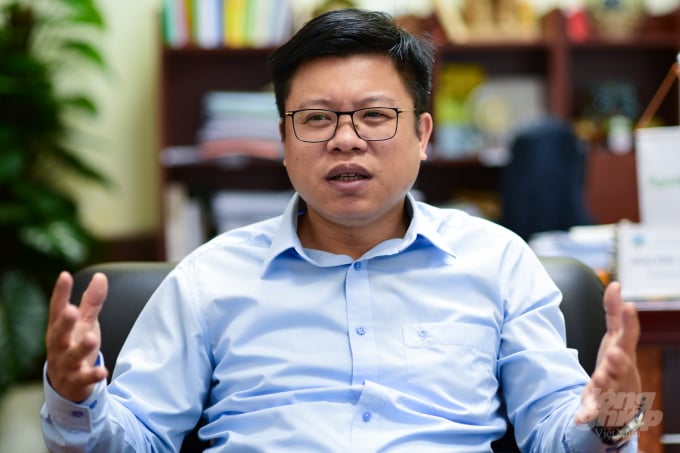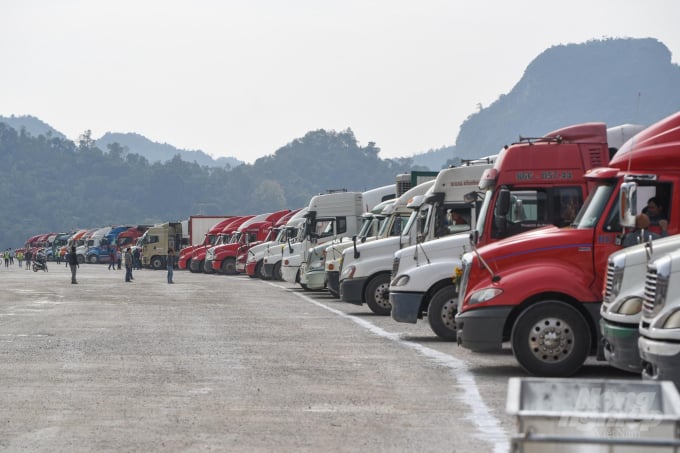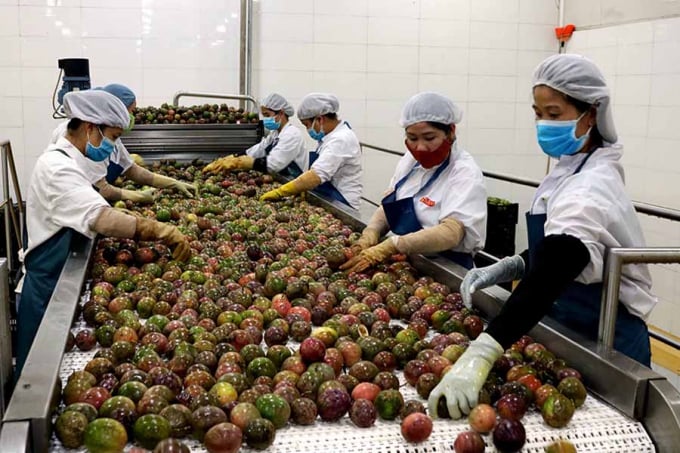June 21, 2025 | 01:18 GMT +7
June 21, 2025 | 01:18 GMT +7
Hotline: 0913.378.918
June 21, 2025 | 01:18 GMT +7
Hotline: 0913.378.918

Nguyen Quoc Toan, Director of the Agricultural Products Processing and Market Development Department, Ministry of Agriculture and Rural Development (MARD). Photo: Tung Dinh.
In an interview held on the occasion of the Lunar New Year 2021, Nguyen Quoc Toan, Director of MARD’s Agricultural Products Processing and Market Development Department, shared with us the opportunities and challenges for agricultural products of Vietnam in 2021, and suggest certain solutions.
Although Vietnam's agriculture underwent a turbulent time last year, it managed to overcome challenges and attained a record export turnover. In your opinion, what advantages and disadvantages will face Vietnamese farm produces this year?
Even though 2021 is likely to witness a number of obstacles, we have noticeable strength to cope with them. The first advantage that is the sound foundation that we have laid, through the development over the past period, especially in the last 5 years. For instance, the agricultural restructuring with value of agricultural products being boosted and the production linkage being enhanced have brought positive results.
In the past 5 years, agriculture has sustained impressive growth. In such a difficult time as in 2020, it still achieved a 2.65% growth. Also during given period, other indicators remained positive, for example, the export turnover of agro-products reached a record of US$ 41 billion, meanwhile, the rate of new rural areas and forest cover both met the set target.
These factors will pave the way for agricultural development in the 2021-2030 period. Besides, the sector also has clear goals, visions, and scopes set by the 13th National Party Congress resolution and State’s social development strategy to follow.
Meanwhile, in 2021, there are certain challenges that we need to quickly respond to. First, new coronavirus variants have evolved in export markets and also have also been found in some localities in Vietnam. Yet, in my opinion, we need to familiarize with and solve the difficulty, consider it an unconventional challenge besides conventional ones like natural disasters and natural enemies.
The second challenge is the connection among phases in agro-product consumption and export. The farm to folk process involves many stages, such as input, production, processing, consumption, export, food safety and so on.
The inferiority of any phase make it hard for the sector to achieve success. Thus, in the coming time, it is necessary to enhance the quality of each phase and strengthen the link of all actors.
Considering our strength and a number of newly-signed free trade agreements (FTAs), how do you evaluate the export potential of high quality agro-products to major markets in the coming time?
In 2020, Vietnam signed many FTAs such as EU – Vietnam FTA, UK-Vietnam and the Regional Comprehensive Economic Partnership. It means Vietnam has far more markets to export products. Nevertheless, it is worth mentioning that these countries have high standard in terms of food safety and food quality.
Therefore, Vietnam needs to ensure that its exports meet their standards. In my opinion, Vietnam’s agriculture has deeply integrated into the international market and it is high time for us to adapt to the global standard and tap all opportunities. It is crucial for us to gain a deep insight into every single FTA and understand thoroughly their benefits and drawbacks, in order to make the most of them.
In 2021, when these agreements start to come into effect, we need to utilize the advantage related to tariff barriers. In the meantime, we need to invest time and efforts to gradually overcome technical barriers. Therefore, we can grasp more opportunities, especially given that we are a world’s leading pepper, rubber, coffee, and rice exporter.

Due to Covid-19 pandemic, thousands of vehicles carrying agricultural exports to China were congested at Lang Son border gate. Photo: Tung Dinh.
In 2021, we must familiarize with the effects of the Covid-19 pandemic, and do not allow the disruption of global supply chains. Second, we must institutionalize action plans of FTAs so that they can reach all levels, sectors and associations.
In addition, consumers in both urban and rural areas should join hands to prioritize Vietnamese ago-products, and brands amid Covid-19 pandemic.
Finally, we need to continue to improve the institutions, which we have done well over the past 5 years with 6 laws passed and decrees and circulars introduced. It still needs more attention in order to make Vietnam a regional agricultural processing center.
What active measures should we do to respond to unprecedented challenges?
I believe many lessons in terms of trade conflicts that we have drawn in recent years remain effective in the coming years.
Besides, as the market of agricultural products is facing volatility, it is crucial for the three stakeholders, namely the government, local authorities and businesses to make concerted efforts in order to address the issue.
In addition, it is vital to focus on human resources development. For example, the field of agricultural product processing is still in need of trained and skilled forces. Therefore, I hope that the colleges and research centers can solve this problem.
Digital transformation in agriculture also constitutes a key factor in agricultural development. The good news is every citizen now has easy and regular access to cyberspace, which will be a good premise for us to make digital transformation in agriculture.
Recently, Vietnam sees more agricultural exports worth billions of USD, including vegetables and fruits, how can we continue to achieve such figures in the near future?
In years there are two aspects that are likely to bring such impressive figures. First, we need to reach more potential markets. For example, the Department coordinated with the Ministry of Foreign Affairs last year to organize a forum to promote our agricultural products to Islamic countries. These markets of 2.2 billion people are promising for Vietnamese agricultural products such as coffee, spices or seafood.
Second, more potential products will be exported. Currently, Vietnam has about 10 agricultural products with export value of over US$ 1 billion. In the next year, potential products of such value will be promoted such as passion fruit with a global reserve of 10%. Vietnam’s fresh passion fruits have been exported to Europe while processed ones have long been present China.

Passion fruits are a Vietnam’s high-value product for export. Photo: Tung Dinh.
Another potential product is durians, which can be officially exported to the Chinese market in 2021. Other products of high value are dairy products, swallow nest, pepper, coconut, mushroom, among others.
Translated by Thu Hang

(VAN) The waste of resources from agricultural by-products and the situation of counterfeit and poor quality goods in production causing losses of thousands of billions were pointed out by the National Assembly deputy.

(VAN) After 5 years of implementation, the CAI initiative has helped coffee growers change their farming practices, moving toward responsible agriculture that meets global export standards.

(VAN) The primary prerequisite for the comprehensive and robust integration of Vietnam's livestock sector into the global value chain is the establishment of a disease control system.

(VAN) The results of national programs are essential for establishing a contemporary livestock sector that is well-equipped to meet the demands of both domestic and international markets, with robust biosafety standards.

(VAN) The UNESCO Global Geopark revalidation of Non nuoc Cao Bang and the transition to a two-tier administrative model are presently undergoing a pivotal moment in Cao Bang, the northernmost province of Vietnam.
/2025/06/13/5330-2-004539_953.jpg)
(VAN) Changing policy mindset and removing investment barriers are urgent requirements to open up new development space for enterprises in the agricultural sector.

(VAN) The areas include the restoration of five million hectares of marine ecosystems.